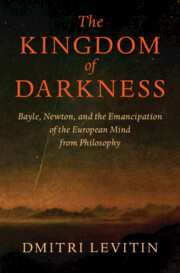Book contents
- The Kingdom of Darkness
- The Kingdom of Darkness
- Copyright page
- Contents
- Preface
- Abbreviations and Conventions
- General Prologue
- Part I Giving Up Philosophy
- Part II Pierre Bayle and the Emancipation of Religion from Philosophy
- II Prolegomena
- II.1 Greece, Asia, and the Logic of Paganism
- II.2 The Manichean Articles and the ‘Sponge of all Religions’
- II.3 Theological Method and the Foundations of Protestant Faith
- II.4 Virtuous Atheism, Philosophic Sin, and Toleration
- Part III Isaac Newton and the Emancipation of Natural Philosophy from Metaphysics
- Part IV The European System of Knowledge, c.1700 and Beyond
- Bibliography
- Index
II.2 - The Manichean Articles and the ‘Sponge of all Religions’
The Problem of Evil and the Rationality of Reformed Predestinarian Belief
from Part II - Pierre Bayle and the Emancipation of Religion from Philosophy
Published online by Cambridge University Press: 23 March 2022
- The Kingdom of Darkness
- The Kingdom of Darkness
- Copyright page
- Contents
- Preface
- Abbreviations and Conventions
- General Prologue
- Part I Giving Up Philosophy
- Part II Pierre Bayle and the Emancipation of Religion from Philosophy
- II Prolegomena
- II.1 Greece, Asia, and the Logic of Paganism
- II.2 The Manichean Articles and the ‘Sponge of all Religions’
- II.3 Theological Method and the Foundations of Protestant Faith
- II.4 Virtuous Atheism, Philosophic Sin, and Toleration
- Part III Isaac Newton and the Emancipation of Natural Philosophy from Metaphysics
- Part IV The European System of Knowledge, c.1700 and Beyond
- Bibliography
- Index
Summary
The most famous subject on which Bayle has been claimed to be either a fideist or an atheist is his discussion of the problem of evil in the ‘Manichean’ articles of the Dictionnaire and in subsequent writings. This chapter contextualises those writings so as to outline Bayle’s sources, and to show that he was engaging in a tripartite polemic about the theological doctrine of predestination. From Gassendi, Bernier, and others Bayle had learnt to argue that the problem of evil had no full solution: a purely rational (pagan) philosophy led to a deterministic fatalism. Gassendi, Bernier and others had used this point to insist on the necessity of adopting a Molinist doctrine of free will. Bayle argued the opposite: while it was indeed impossible to reconcile predestination and free will, history had shown that this did not lead to moral laxness. At the same time, the predestinarian position was more rational than the Molinist one, since it best accorded with the idea of unitary, omnipotent deity (which all sides agreed was rational). It is shown that Bayle adopted this argument from several Reformed theologians with whose writings he was well familiar: his teachers Louis Tronchin and Francis Turretin, and above all Jacques Abbadie and his then-friend Pierre Jurieu. But for Bayle this conclusion also had a political pay-off that put him at odds with Jurieu: that the difficulties of theological doctrine should lead to mutual toleration of differing opinions, rather than to a destabilising odium theologicum.
- Type
- Chapter
- Information
- The Kingdom of DarknessBayle, Newton, and the Emancipation of the European Mind from Philosophy, pp. 308 - 374Publisher: Cambridge University PressPrint publication year: 2022

